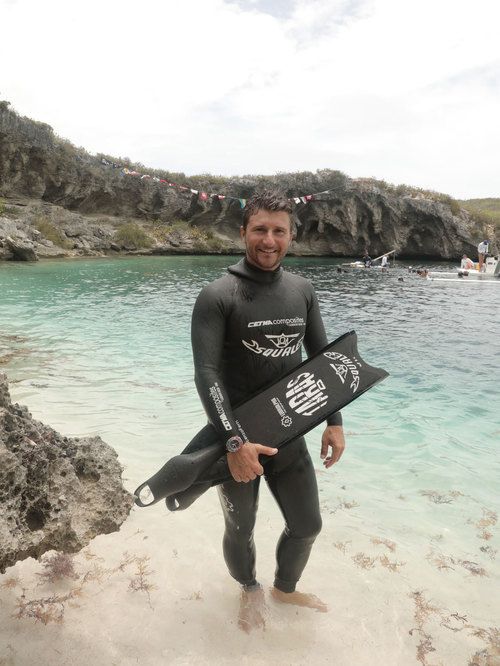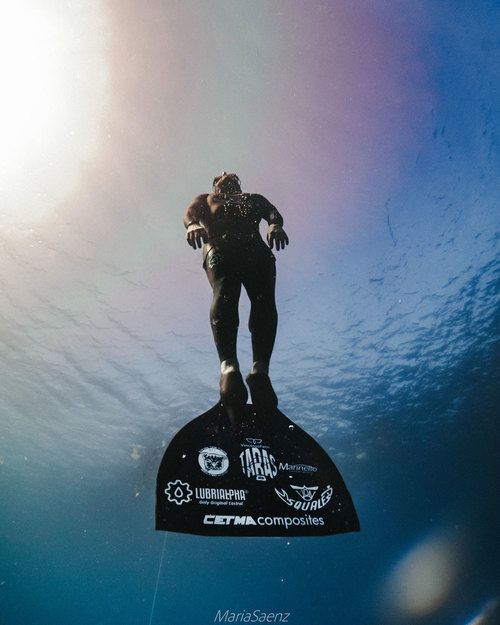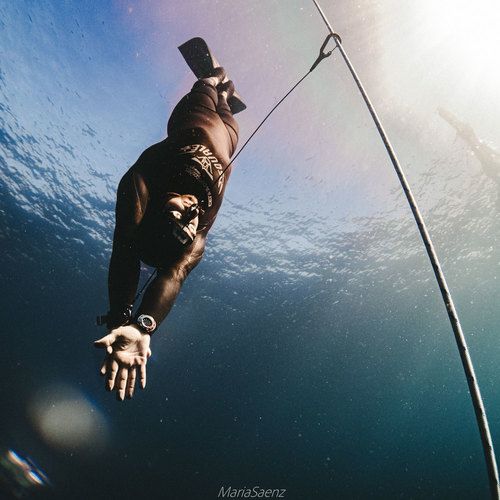The Joys and Challenges of the Deep
Text by Lara Lambiase
An interview with freediving champion Vincenzo Ferri.
Vincenzo Ferri is a 37-year old professional athlete who's been competing for the Freediving Italian National Team since 2014. Throughout his career he's set three world records and seven Italian records. CONI (the Italian Olympic Committee) awarded him with four silver medals for his athleticism.
An interview with freediving champion Vincenzo Ferri.
Vincenzo Ferri is a 37-year old professional athlete who's been competing for the Freediving Italian National Team since 2014. Throughout his career he's set three world records and seven Italian records. CONI (the Italian Olympic Committee) awarded him with four silver medals for his athleticism.

In May 2021 he set the Variable Weight Italian record without fins (-103 mt, Procida Island) and in September 2021 he set two world records in freshwater (Garda Lake): Constant Weight bi-fins (-86 mt) and Constant Weight mono-fin (-95 mt). He’s recently participated in the 5th CMAS Freediving World Championship outdoor (October 2021 in Kas, Turkey). We met with him and asked about his love affair with freediving, and how freediving competitions —including emergencies —are currently managed.
How and when did your passion for the sea and freediving start, and which path led you to the top of this discipline?
Since I was a kid I’ve always had fun putting my head under water to see the world beneath. I used to play with my sister challenging her to hold our breath near the buoy lines at beach clubs. So I guess mine is a very innate passion. Growing up, I felt the need to attend a freediving course to get a deeper understanding and learn what I needed to do to progress. As I gained more awareness, I realised that I had natural skills that I felt compelled to indulge. So I began listening to them. When I was 21, I took my first freediving class in Naples with instructor and currently Apnea Academy Vice-President Enrico Lupo: he pushed me into the world of freediving competitions. I’ll always be grateful to him.
How and when did your passion for the sea and freediving start, and which path led you to the top of this discipline?
Since I was a kid I’ve always had fun putting my head under water to see the world beneath. I used to play with my sister challenging her to hold our breath near the buoy lines at beach clubs. So I guess mine is a very innate passion. Growing up, I felt the need to attend a freediving course to get a deeper understanding and learn what I needed to do to progress. As I gained more awareness, I realised that I had natural skills that I felt compelled to indulge. So I began listening to them. When I was 21, I took my first freediving class in Naples with instructor and currently Apnea Academy Vice-President Enrico Lupo: he pushed me into the world of freediving competitions. I’ll always be grateful to him.

What are your thoughts and feelings when you’re in the depths?
Every thought vanishes. My body and the sea only exist, I feel them as one. I can totally focus on my body so as to allow him to succeed in what I train for every day. Over the years I learned it is better to give up a dive than to risk an incident, if my state of mind is not in tune with the rest or if I feel I’ve not fully recovered. The best part of the dive for me is the free fall—in those few moments I perceive myself as weightless, my body fluctuates like I’m flying into water; it’s a feeling that I really love.
Tell us about the latest international competition you attended, the CMAS Freediving Outdoor World Championship, which took place last October.
This year the CMAS Freediving Outdoor World Championship was held in Kas, Turkey. It was a great spot because of its marine environment and sea conditions which are very important when making challenging dives. To attend such an important event you work hard for months, and the fears are many, but you set them aside to try to give your best. The World Championship is a different event from every other competition: you literally carry the weight of your own country, this is a huge responsibility. I was not totally satisfied with my performance in Kas: I could have handled it better. Last year was very intense for me and full of success. I also set some records and I can consider myself happy and confident for the future. You can always learn from mistakes and treasure them in order to improve yourself.
Every thought vanishes. My body and the sea only exist, I feel them as one. I can totally focus on my body so as to allow him to succeed in what I train for every day. Over the years I learned it is better to give up a dive than to risk an incident, if my state of mind is not in tune with the rest or if I feel I’ve not fully recovered. The best part of the dive for me is the free fall—in those few moments I perceive myself as weightless, my body fluctuates like I’m flying into water; it’s a feeling that I really love.
Tell us about the latest international competition you attended, the CMAS Freediving Outdoor World Championship, which took place last October.
This year the CMAS Freediving Outdoor World Championship was held in Kas, Turkey. It was a great spot because of its marine environment and sea conditions which are very important when making challenging dives. To attend such an important event you work hard for months, and the fears are many, but you set them aside to try to give your best. The World Championship is a different event from every other competition: you literally carry the weight of your own country, this is a huge responsibility. I was not totally satisfied with my performance in Kas: I could have handled it better. Last year was very intense for me and full of success. I also set some records and I can consider myself happy and confident for the future. You can always learn from mistakes and treasure them in order to improve yourself.

“The best part of the dive for me is the free fall—In those few moments I perceive myself as weightless, my body fluctuates like I’m flying into water”
What role do safety divers play in freediving competitions? Are there doctors on the premises, and what are the eventualities to face?
Contrary to what happened some years ago, today deep freediving competitions do not have scuba divers as a part of the safety staff, but only rely on professional freediving athletes, who are there to ensure divers' safety in the range of 35 meters depth. If ever a problem occurs, safety freedivers are our guardian angels because they rapidly intervene and bring the ailing athlete to the surface. Common problems are black out, shallow water black out and LMC (loss of motor control). These situations all need rescue operations.
We athletes are bound to the competition main line with a cable called lanyard which secures us, allowing safety staff to give prompt assistance if needed, and keeps us close to the line, even in case of drift. A recovery system, electric or manual, called counterbalance (or counterweight), can be deployed if a problem occurs at depth: it is designed to quickly retrieve an athlete out of reach of safety divers (at a speed greater than 1 meter/sec). This system is usually located in the pontoon or deck boat, utilises a weight, and is only deployed in the event of a motionless diver.
Once the athlete reaches the surface the medical team can provide first aid intervention (the emergency team is also located in the deck boat, where an AED (automated external defibrillator) is on hand. The medical staff must guarantee assistance to those who suffer an accident until their health is restored, with transfer to local medical facilities if necessary. A medical doctor, who is skilled and experienced in cardio-pulmonary resuscitation, is always present at the competition area and is responsible for it. An ambulance is also located near the competition area. Everything is carefully studied and properly planned, everyone works in unison; in other words it seems safer than go biking: Safety first!
“I am a DAN Europe member and I recommend that divers at any level become a member, because the advantages are many. I am also interested in DAN's research studies”
Have you ever used the services and assistance DAN Europe offers? Do you recommend for freedivers to be DAN members?
Fortunately I have never had to enlist help from DAN Europe Emergency Hotline for a medical issue, I just asked the medical staff for some tips. I do know very well what DAN does worldwide, both for scuba divers and freedivers. I am a DAN Europe member and I recommend that divers at any level become a member, because the advantages are many. I am also interested in DAN's research studies, especially those in partnership with Y-40, The Deep Joy (the world’s deepest thermal pool), which are aimed at analysing specific aspects of the breath-hold diving physiology. In my opinion, DAN Europe is at the cutting edge.
What will be your next sporting event?
Looking ahead to the next season, I recently resumed training after a well-deserved rest following the last World Championship. At present I am in Sestriere (Northern Italy), a mountain location at an altitude over than 2000 m above sea level. Here I dedicate myself especially to aerobic activities and snowshoeing because of the advantages of conducting exercise at high altitude in terms of body improvements. Working out here is surely harder, but more profitable.
I don’t have a set schedule yet, I don’t exactly know what events I will attend, but you’ll surely see me in the most important competitions. I am going to participate in the next World Freediving Championship to try to improve my personal bests with one more year of experience. Now that I am thinking about it, I can’t wait to dive again soon!
About the author
Lara Lambiase is an avid diver who lives and works in Rome. She is a Medical Doctor specialised in Infectious Diseases, and Diving and Hyperbaric Medicine. Since 2016 she is one of the dive docs on call at the 24/7 DAN Europe Medical Hotline.
What role do safety divers play in freediving competitions? Are there doctors on the premises, and what are the eventualities to face?
Contrary to what happened some years ago, today deep freediving competitions do not have scuba divers as a part of the safety staff, but only rely on professional freediving athletes, who are there to ensure divers' safety in the range of 35 meters depth. If ever a problem occurs, safety freedivers are our guardian angels because they rapidly intervene and bring the ailing athlete to the surface. Common problems are black out, shallow water black out and LMC (loss of motor control). These situations all need rescue operations.
We athletes are bound to the competition main line with a cable called lanyard which secures us, allowing safety staff to give prompt assistance if needed, and keeps us close to the line, even in case of drift. A recovery system, electric or manual, called counterbalance (or counterweight), can be deployed if a problem occurs at depth: it is designed to quickly retrieve an athlete out of reach of safety divers (at a speed greater than 1 meter/sec). This system is usually located in the pontoon or deck boat, utilises a weight, and is only deployed in the event of a motionless diver.
Once the athlete reaches the surface the medical team can provide first aid intervention (the emergency team is also located in the deck boat, where an AED (automated external defibrillator) is on hand. The medical staff must guarantee assistance to those who suffer an accident until their health is restored, with transfer to local medical facilities if necessary. A medical doctor, who is skilled and experienced in cardio-pulmonary resuscitation, is always present at the competition area and is responsible for it. An ambulance is also located near the competition area. Everything is carefully studied and properly planned, everyone works in unison; in other words it seems safer than go biking: Safety first!
“I am a DAN Europe member and I recommend that divers at any level become a member, because the advantages are many. I am also interested in DAN's research studies”
Have you ever used the services and assistance DAN Europe offers? Do you recommend for freedivers to be DAN members?
Fortunately I have never had to enlist help from DAN Europe Emergency Hotline for a medical issue, I just asked the medical staff for some tips. I do know very well what DAN does worldwide, both for scuba divers and freedivers. I am a DAN Europe member and I recommend that divers at any level become a member, because the advantages are many. I am also interested in DAN's research studies, especially those in partnership with Y-40, The Deep Joy (the world’s deepest thermal pool), which are aimed at analysing specific aspects of the breath-hold diving physiology. In my opinion, DAN Europe is at the cutting edge.
What will be your next sporting event?
Looking ahead to the next season, I recently resumed training after a well-deserved rest following the last World Championship. At present I am in Sestriere (Northern Italy), a mountain location at an altitude over than 2000 m above sea level. Here I dedicate myself especially to aerobic activities and snowshoeing because of the advantages of conducting exercise at high altitude in terms of body improvements. Working out here is surely harder, but more profitable.
I don’t have a set schedule yet, I don’t exactly know what events I will attend, but you’ll surely see me in the most important competitions. I am going to participate in the next World Freediving Championship to try to improve my personal bests with one more year of experience. Now that I am thinking about it, I can’t wait to dive again soon!
About the author
Lara Lambiase is an avid diver who lives and works in Rome. She is a Medical Doctor specialised in Infectious Diseases, and Diving and Hyperbaric Medicine. Since 2016 she is one of the dive docs on call at the 24/7 DAN Europe Medical Hotline.
Posted in Alert Diver Summer Editions, DAN Europe Blog, Dive Fitness, Dive Safety Tips
Posted in Freedive, Breath Hold Diving, Pure Apnea, Apnea, Vincenzo Ferri., Lara Lambiase
Posted in Freedive, Breath Hold Diving, Pure Apnea, Apnea, Vincenzo Ferri., Lara Lambiase
Categories
2025
2024
February
March
April
May
October
My name is Rosanne… DAN was there for me?My name is Pam… DAN was there for me?My name is Nadia… DAN was there for me?My name is Morgan… DAN was there for me?My name is Mark… DAN was there for me?My name is Julika… DAN was there for me?My name is James Lewis… DAN was there for me?My name is Jack… DAN was there for me?My name is Mrs. Du Toit… DAN was there for me?My name is Sean… DAN was there for me?My name is Clayton… DAN was there for me?My name is Claire… DAN was there for me?My name is Lauren… DAN was there for me?My name is Amos… DAN was there for me?My name is Kelly… DAN was there for me?Get to Know DAN Instructor: Mauro JijeGet to know DAN Instructor: Sinda da GraçaGet to know DAN Instructor: JP BarnardGet to know DAN instructor: Gregory DriesselGet to know DAN instructor Trainer: Christo van JaarsveldGet to Know DAN Instructor: Beto Vambiane
November
Get to know DAN Instructor: Dylan BowlesGet to know DAN instructor: Ryan CapazorioGet to know DAN Instructor: Tyrone LubbeGet to know DAN Instructor: Caitlyn MonahanScience Saves SharksSafety AngelsDiving Anilao with Adam SokolskiUnderstanding Dive Equipment RegulationsDiving With A PFOUnderwater NavigationFinding My PassionDiving Deep with DSLRDebunking Freediving MythsImmersion Pulmonary OedemaSwimmer's EarMEMBER PROFILE: RAY DALIOAdventure Auntie: Yvette OosthuizenClean Our OceansWhat to Look for in a Dive Boat
2023
January
March
Terrific Freedive ModeKaboom!....The Big Oxygen Safety IssueScuba Nudi ClothingThe Benefits of Being BaldDive into Freedive InstructionCape Marine Research and Diver DevelopmentThe Inhaca Ocean Alliance.“LIGHTS, Film, Action!”Demo DiversSpecial Forces DiverWhat Dive Computers Don\'t Know | PART 2Toughing It Out Is Dangerous
April
